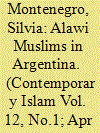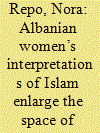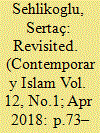|
|
|
Sort Order |
|
|
|
Items / Page
|
|
|
|
|
|
|
| Srl | Item |
| 1 |
ID:
157913


|
|
|
|
|
| Summary/Abstract |
This article examines contemporary aspects of the identity construction of the ‘Alawi diaspora in Argentina. In the local context, the preservation of ‘Alawi singularity has so far been a key element in the group’s identity. The strategies for integration as legitimate Muslims in the wider Islam and the closeness to Shi’ism are relatively independent of how these processes took place in the homeland. I first describe the geography of the diaspora in Argentina, comprising the spaces and institutions where descendants settled all over the country. I analyze the factors that helped keep the nodes connected and I will demonstrate that these constitute a center/periphery logic for communities concerning the alleged degrees of preservation of the culture of origin they symbolize. I will try to show that ‘Alawis integrated into the diversity of Islam in Argentina while preserving their sectarian borders and, at the same time, stressing an “Arab” identity. I argue that these strategies should be understood in the local arena of an intra-Islamic pluralism that constitutes Muslim presence in Argentina, where the dynamics of sectarianisms assume idiosyncratic characteristics. Finally, I will show institutional closeness to Shi’ism as a recent development, promoted by the common political stance of both groups on the conflict in Syria. We will see that this closeness does not imply the dissolution of doctrinal boundaries between Shi’is and ‘Alawis and that it involves a redefinition of the diaspora in terms of increasingly claiming a Syrian national origin.
|
|
|
|
|
|
|
|
|
|
|
|
|
|
|
|
| 2 |
ID:
157912


|
|
|
|
|
| Summary/Abstract |
Even though rarely acknowledged, approximately one fourth of all European Muslims live in the Balkans. These Muslims, as well as women of the Balkans, are seldom in the focus of scientific research on Islam and Europe. This article discusses themes related to the women’s movement and feminism in the Balkans and within Islamic framework from women’s point of view. The research context is located in the Republic of Macedonia and ethnographic material builds on thematic interviews with Albanian Muslim women. Four generally recognized orientations are distinguished (1) atheist or antireligious feminism, (2) secular feminism, (3) gender complementarity as an ideal and (4) Islamic/Muslim feminism(s), and used as analytical tools while ethnographic interview material is tackled. Article sheds light on Albanian-speaking women’s thoughts concerning Islam in the contemporary context, and tendencies of these thoughts to enlarge space that women occupy through personal interpretations of Islamic tradition.
|
|
|
|
|
|
|
|
|
|
|
|
|
|
|
|
| 3 |
ID:
157914


|
|
|
|
|
| Summary/Abstract |
Sufi mystical experiences and practices are populated with objects. Objects exist among masters as well as disciples and followers regardless of the meanings and significations that practices impose on them. The life of these objects begins before they are enacted into sociocultural and religious relationships, as they are crafted or traded before they take on the overwhelming semiosis ascribed to them by religious-cultural codes or social networks. This article presents an apprenticeship ethnographic journey in which I follow an Iranian Sufi master and, along with him, the tensile life of Sufi prayer beads, or tasbihs. I address prayer beads as an object prior to their gaining of any religious meaning in the networks of everyday life. Tracing the material life of prayer beads reveals how the “objectness” of the rosary preexists the material practices that give it meaning in the Sufi order. Through the approach of speculative realism I examine what it means to study a religious-object-in-itself. I follow the religiously loaded object and its spiritual emergence by way of object-oriented ontology to forgo the meanings and relationships that shadow the objects.
|
|
|
|
|
|
|
|
|
|
|
|
|
|
|
|
| 4 |
ID:
157915


|
|
|
|
|
| Summary/Abstract |
Drawing on a framework that goes beyond the usual securitization lens and that includes other neglected sociological dynamics, namely consumerism and individualization, this article explores an overlooked form of dress in the research on Islamic dress in the West which is Islamic street wear. This analysis interrogates what Islamic street wear reveals, in terms of identity, about the experience of young Muslims living as a minority in secular spaces. Various messages collected from message T-shirts are deconstructed to precisely highlight the effect of these different dynamics on the articulation of identities by young Muslims. A theoretical framework grounded in the notion of hybridity guides a systematic content analysis of the messages. The analysis of these messages reveals the strong individualization of faith deriving from consumerist patterns, the rather limited expression of the controversial “ummatic” loyalty to Muslims worldwide and the assertion of pride in Muslim identity.
|
|
|
|
|
|
|
|
|
|
|
|
|
|
|
|
| 5 |
ID:
157916


|
|
|
|
|
| Summary/Abstract |
This article locates imaginative aspects of human subjectivity as a feminist issue by reviewing the concept of agency in the genealogy of Muslim and Middle Eastern women in anthropological and ethnographic literature. It suggests that, if feminist scholarship of the Middle East would continue approaching to Muslim women’s agency -as it has been doing for decades-, it should do so as an epistemological question and thus expand the limits of ethnographic and analytical focus beyond the broader systems, such as family, nation, religion, and state. As an example to this proposition, the article then discusses the recent work on aspects of selfhood that escape from the structures, rules, systems, and discursive limits of life but captures imaginations, aspirations, desires, yearnings, and longings.
|
|
|
|
|
|
|
|
|
|
|
|
|
|
|
|
|
|
|
|
|